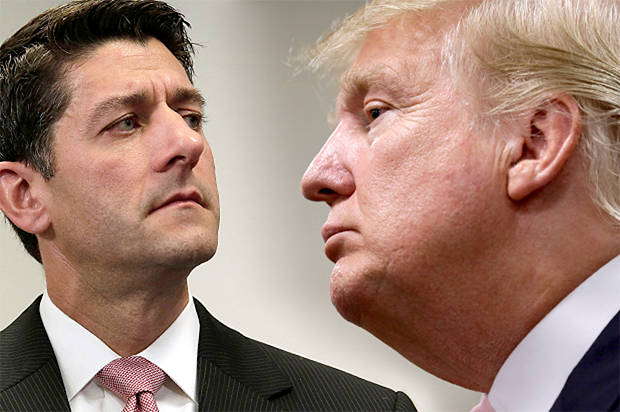 |
| Paul Ryan's budget proposals never added up. Donald Trump by-passes policy altogether, so, no worries. |
It's been a long time since Republican policy has rested on truth.
- Want to reduce the deficit? Cut taxes!
- Want to reduce spending? Raise defense spending!
- Want to repeal and replace Obamacare? Sure, uh, ????
- Want more "personal responsibility?" Don't reform payday loans!
- Want to "make America great again?" Defund infrastructure, education, and research spending!
- Want the free markets to work? Subsidize fossil fuels!
- Want to reduce medical costs? Don't allow negotiating prices with drug companies!
Now comes Trump, who campaigns with slogans, insults, attacks, and threats.
- Taxes? "Oh, we're bringing them down, folks, down, I can assure you."
- Wages? "Too damned high. I don't think the minimum wage is good."
- Obamacare? "It's a disaster, that's gone, I guarantee, the first thing I do."
- Defense spending? "Obama's been a disaster for our military, it's falling apart, don't worry, we're gonna fix that."
- Free trade? "We're gonna stop all these agreements and bring our jobs back. China is stealing our jobs, our businesses. It's gonna stop, it's gonna stop, friends. I love the Chinese, by the way."
- Defense treaties and pacts? "Why are we paying for all this? Let Japan defend itself. With nukes? Sure."
Political Animal explains:
While they worked to reduce taxes on the wealthy, get rid of government regulations and “drown government in the bathtub (all of which benefit the top 1%), they had to convince everyday Americans that their policies would actually help them.
After the Bush/Cheney era and the Great Recession, being post-truth didn’t work very well anymore. Most Americans saw very clearly what happened when the Republican agenda was enacted. Rather than re-think that agenda, they simply went post-policy and obstructed anything President Obama and the Democrats tried to do. In order to rally their ground troops in support, Republican fanned the flames of racism, fear and anger. As I’ve written before, Donald Trump is the epitome of post-policy nihilism.The post-truth agenda did roll on in the states, hence the disintegration of services in states like Kansas, Louisiana, Wisconsin, and Michigan. What brought support for these Republican "policies" in the states was the anger by the near-poor toward the real poor, thinking that, through what remains of our welfare state, the poor were taking advantage. Much of this, especially in the South, was driven by racism (even though in the rural South most welfare spending goes to poor whites.)
Here Political Animal quotes Jonathan Chait:
There is nothing inherently racist about Ryan’s policy agenda. The arguments for enormous, regressive tax cuts, deregulation of finance and carbon pollution, and large reductions in spending assistance for the poor may be unpersuasive, but they have no intellectual connection to racism. The trouble for Republicans is that building a real-world constituency for these policies does rely on racism. Conservatives stopped the momentum of the New Deal in the mid-1960s only when they associated it with support for the black underclass. Republican politics has grown increasingly racialized over time, a trend that has dramatically accelerated during the Obama era.The whole article is fascinating. What it highlights is that this election hinges, for Trump, on exciting his white-racist supporters while somehow "pivoting" to a platform shaped to appeal to more than his racist base. For Clinton's part, she has to appeal to the same disenfranchised (and, yes, racist) whites on a less-charged economic basis and bring a modest amount of them over to her.
For Trump's part, he has to peel off some of Clinton's minority supporters. Who has a better chance of pulling that off? My money's on Clinton. We'll see.
Clinton's chances are muddied by the crazies on the margins of the Bernie crowd, those that believe that the "fix was in" and the "system was rigged." Pointing out that the same system was in place when Clinton lost to Obama, and she conceded gracefully and brought her crowd to Obama's side may or may not assuage the anger. If Bernie can do that, Clinton's chances rise significantly.
On Trump's side, it's unclear the extent that he gets helped by Sanders supporters who flock to him in anger (were they always akin to Trump's gang?) or sit out because #NeverHillary?
Chill the beer and pop the corn. This is going to be one for the ages.

No comments:
Post a Comment